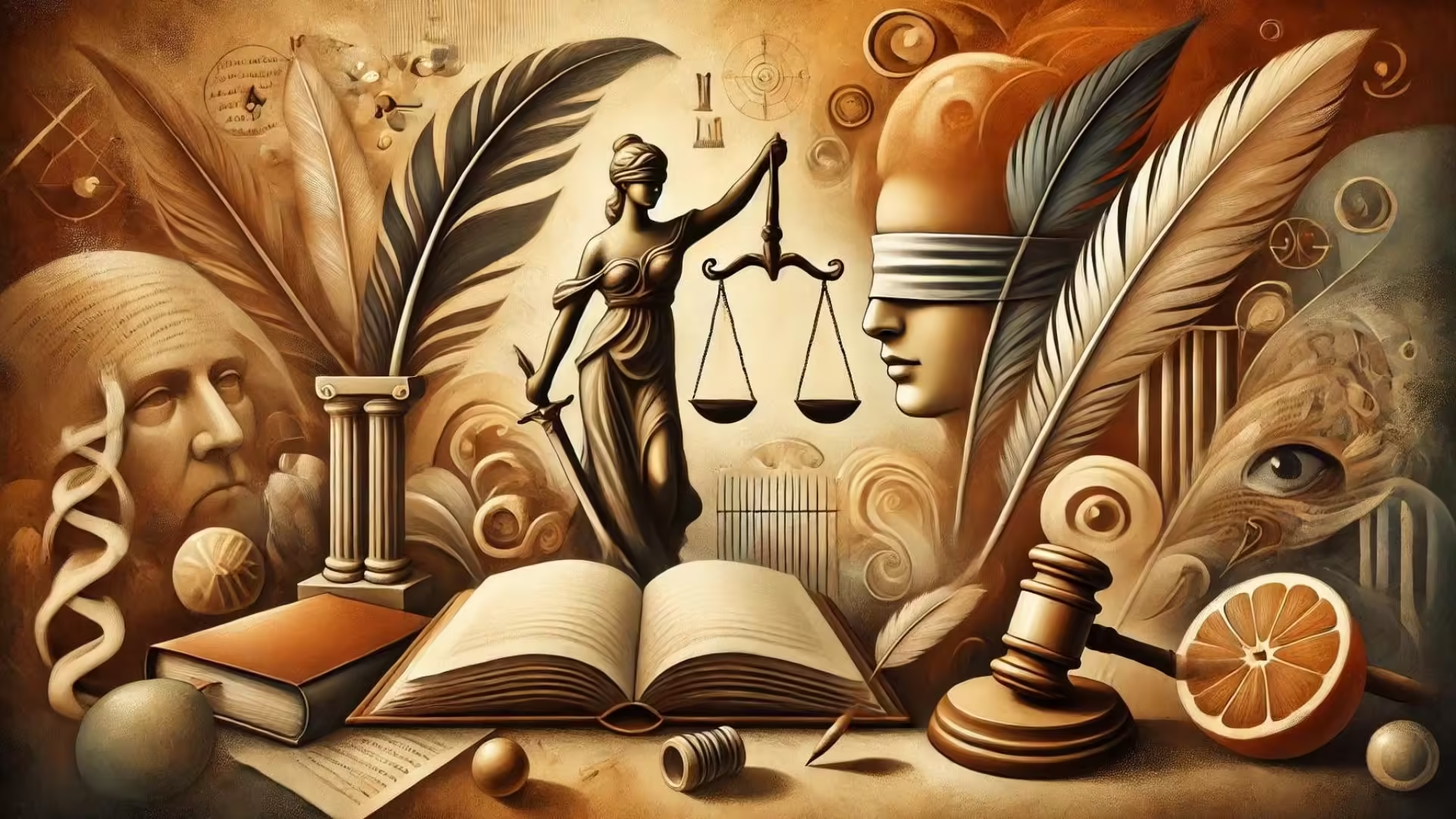Justice has always been a fundamental theme in literature, capturing the human desire for fairness, accountability, and moral order. From ancient epics to modern novels, the concept of justice has driven plots, shaped characters, and sparked debates that resonate with readers on a personal and societal level. But what does justice in literature really mean? How do different authors explore this theme, and what can we learn from their interpretations of justice?
In this article, we’ll dive into how literature reflects society’s evolving views on justice, examine iconic works that have shaped our understanding of the concept, and show how these literary explorations can deepen our own understanding of fairness in real life.
Justice in Literature: A Reflection of Society
Literature serves as a mirror to society, and the portrayal of justice in stories often reflects the values, challenges, and conflicts of the time. In some works, justice is portrayed as a clear, moral outcome where good triumphs over evil. In others, it’s a complex, elusive goal—something that is sought but not always attained.
The exploration of justice in literature forces us to confront difficult questions: What is fairness? Who determines what is just? Is justice universal, or does it depend on individual circumstances?
Consider the legal system in today’s world. It’s meant to uphold justice, but we often hear stories of people who feel the system has failed them. The same complexity appears in literature—characters may seek justice, but whether they achieve it often depends on who holds power and how society defines what is “just.”
Classic Examples of Justice in Literature
- To Kill a Mockingbird by Harper Lee
This American classic tackles the themes of racial injustice and moral integrity. Through the trial of Tom Robinson, an innocent black man accused of raping a white woman, the novel explores how societal prejudices can distort the concept of justice. Atticus Finch’s defense of Robinson represents the pursuit of true justice, but the outcome of the trial shows how deeply ingrained biases can prevent fairness.
The novel reflects the ongoing struggles with racial injustice in many societies today. Just like in the story, people often face unfair treatment based on race, and the legal system may not always deliver the justice they deserve.
- Les Misérables by Victor Hugo
Hugo’s epic novel delves into both legal and moral justice. Jean Valjean, the protagonist, spends years in prison for stealing a loaf of bread, illustrating how the law can be both harsh and unfair. Meanwhile, Inspector Javert, who is obsessed with upholding the law, represents rigid legal justice without considering human compassion. The story questions whether true justice should balance the law with mercy.
In real life, we often face the same dilemma: Should laws always be applied strictly, or should they be adjusted to account for human circumstances? Hugo’s exploration of justice challenges us to consider how mercy and compassion should play a role in fairness.
- The Crucible by Arthur Miller
Set during the Salem witch trials, The Crucible portrays a society consumed by fear, where the pursuit of justice becomes distorted by hysteria and vengeance. The characters in the play are falsely accused of witchcraft, and justice becomes a tool for manipulation rather than fairness. The play critiques the dangers of mob mentality and how easily justice can be corrupted when fear overtakes reason.
We can draw parallels between The Crucible and modern-day situations where justice systems are manipulated by public fear or political pressure, such as in high-profile criminal cases where emotions overshadow facts.
Justice as an Evolving Concept in Literature
The way justice is depicted in literature has evolved over time. In ancient epics like Homer’s The Iliad, justice was often depicted as divine retribution—heroes fought for honor, and justice was meted out by the gods. In contrast, modern literature often presents a more nuanced view, questioning whether justice can ever be truly achieved in an imperfect world.
In dystopian literature, justice often becomes a tool of oppression. Take George Orwell’s 1984, for example. In this world, “justice” is defined by a totalitarian regime that uses fear and surveillance to control its citizens. The concept of justice is twisted to serve those in power, making readers question how justice is defined in their own societies.
As societies change, so do their justice systems. Literature often reflects these changes, highlighting the flaws and challenges in how justice is pursued. Whether in terms of civil rights, gender equality, or economic justice, the stories we read reveal the ongoing struggle to balance fairness and power.
Why Justice in Literature Matters
The reason justice is such a compelling theme in literature is that it speaks to our deepest values. We are drawn to stories about justice because they reflect our own desires for fairness, accountability, and moral clarity. Whether a character gets the justice they deserve or is denied it, these stories resonate because they mirror our own hopes and frustrations.
Justice in literature also encourages us to think critically about the world around us. By examining how justice is portrayed in different stories, we gain new perspectives on our own legal systems, moral beliefs, and the ways we treat others. Literature challenges us to reflect on how justice should be pursued, and whether true justice can ever be achieved.
Think about the way we view high-profile court cases or political scandals. Our sense of justice is often influenced by the media and public opinion, just as it is in literature. Understanding the complexity of justice in stories can help us better navigate these real-world issues, pushing us to question our assumptions and strive for a fairer society.
Justice in literature is not just about right and wrong—it’s about exploring the grey areas that define human experience. By delving into these stories, we learn that justice is a concept that evolves with society, shaped by our values, our flaws, and our humanity.
Next time you read a book or watch a film, pay attention to how justice is portrayed. Ask yourself: Who defines what’s just in the story? How do the characters’ actions reflect or challenge your own understanding of fairness? Then, take those insights into your own life—whether it’s standing up for what’s right, challenging injustice, or finding compassion in difficult situations.
Expand Your Vocabulary
- Justice
Meaning: The concept of fairness, moral rightness, and the administration of laws to ensure that people are treated justly.
In Context: Justice in literature often explores how fairness is applied or denied in different societal or personal situations.
Everyday Use: We talk about justice when we refer to fairness in courts, workplaces, or everyday interactions—when someone says, “I just want justice,” they seek fair treatment. - Prejudice
Meaning: Preconceived opinions or judgments made about someone or something without factual knowledge or understanding.
In Context: In To Kill a Mockingbird, prejudice prevents true justice from being served during Tom Robinson’s trial.
Everyday Use: Prejudice can affect how people are treated in daily life, whether based on race, gender, or social status, often leading to unfair treatment. - Moral Integrity
Meaning: The quality of being honest and adhering to strong ethical principles.
In Context: Atticus Finch represents moral integrity by defending an innocent man, despite societal pressures.
Everyday Use: We value moral integrity in leaders and public figures who stand by their principles even in the face of challenges. - Compassion
Meaning: Sympathetic awareness of others’ suffering, accompanied by a desire to help.
In Context: In Les Misérables, Jean Valjean’s character arc highlights the power of compassion in achieving a more just society.
Everyday Use: Showing compassion in everyday life means offering understanding and kindness to those in difficult circumstances. - Bias
Meaning: An unfair preference or prejudice in favor of or against someone or something.
In Context: Bias in legal systems can prevent justice from being served, as seen in many literary works.
Everyday Use: Bias often affects how we make decisions, whether we are aware of it or not, influencing our opinions in personal and professional situations. - Retribution
Meaning: Punishment that is considered morally right and fully deserved in response to wrongdoing.
In Context: In ancient literature, retribution was often seen as a divine form of justice, where wrongdoers faced consequences for their actions.
Everyday Use: People may seek retribution when they feel wronged and believe that the punishment should fit the crime. - Mercy
Meaning: Compassionate treatment of someone, even when they may deserve punishment.
In Context: Victor Hugo’s Les Misérables challenges the notion of strict justice by introducing mercy as a form of higher moral judgment.
Everyday Use: Showing mercy in daily life might involve forgiving someone who has wronged you, even when you have the right to be angry. - Power Dynamics
Meaning: The way power is distributed and affects relationships, often influencing who has control over decisions and outcomes.
In Context: Literature often explores power dynamics, showing how those in power can manipulate justice to serve their interests.
Everyday Use: Power dynamics play a role in workplaces, schools, and social groups, where authority figures or dominant individuals may influence outcomes. - Hysteria
Meaning: An uncontrollable emotional excess, often fueled by fear or panic, leading to irrational behavior.
In Context: In The Crucible, hysteria drives the community to unjustly accuse and punish innocent people for witchcraft.
Everyday Use: Hysteria can be seen in modern times when fear or misinformation leads to exaggerated or harmful reactions. - Fairness
Meaning: The quality of making judgments that are free from discrimination or favoritism.
In Context: Fairness is a central theme in stories exploring justice, as characters often strive for outcomes that treat everyone equally and without bias.
Everyday Use: Fairness is something we seek in everyday situations, like dividing responsibilities at work or ensuring everyone has an equal opportunity in a game.
Let’s Talk
- How do you think literature’s portrayal of justice challenges or reinforces your own views on fairness? Are there books that have shaped your perspective on justice?
- In To Kill a Mockingbird, we see the effects of racial prejudice on the legal system. How do you think prejudice affects modern-day justice systems, and what steps could be taken to reduce its impact?
- Compassion and retribution are often presented as opposing forces in literature. Do you think true justice involves balancing these two concepts? Can you think of a time when you showed compassion instead of seeking retribution in your own life?
- How do power dynamics affect the pursuit of justice in your community or country? Do you think those in power always use their influence fairly, or are there examples where power has led to injustice?
- Literature often questions whether justice can ever be fully achieved in an imperfect world. Do you believe that true justice is possible, or do you think it’s always compromised by human flaws and biases?
- How does the concept of mercy influence your understanding of justice? Can you think of a situation where showing mercy, rather than strict punishment, led to a better outcome?
- In The Crucible, hysteria overtakes reason, leading to injustice. How do you think fear and panic influence modern-day decision-making, both in personal and societal contexts?
- How important do you think moral integrity is when pursuing justice? Can you think of real-life examples where someone’s moral integrity played a key role in achieving a just outcome?
These questions encourage deeper reflection on the theme of justice and its relevance both in literature and in the real world. Engage with others by discussing these ideas to broaden your understanding of justice and how it applies to everyday life.










0 Comments